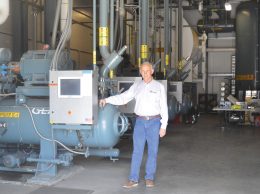CKE Restaurants has pulled the plug on a deal that would have made it a public company again and raised as much as $213.3 million for the Carpinteria-based fast-food operator.
All sides agree investors ultimately balked because of bad timing. But analysts also lay part of the blame on the heavy debt load CKE incurred in a leveraged buyout by a private equity firm two years ago, during which the company’s new owners and top executives pocketed hundreds of millions of dollars in dividends and bonuses while slashing contributions to employee retirement plans.
The company’s leaders, on the other hand, blame the rising costs of drought-plagued Midwestern corn and Obamacare.
“You have commodities prices and health care costs going up in a stagnant economy,” CEO Andy Puzder told the Business Times. “That’s a big problem.”
CKE issued a statement Aug. 9 saying “market conditions” had prompted it to scrap its IPO. The offering would have been CKE’s second debut on the public markets. The company that was founded in 1956 by Carl Karcher was taken private by New York-based private equity giant Apollo Management in 2010 in a deal valued at about $1 billion, including debt.
Industry and equity analysts said that when New York-based Apollo Management tried to put CKE — the owner of the Carl’s Jr. and Hardee’s fast-food brands — back on the public markets two years after taking it private in a leveraged buyout, investors recoiled from the firm’s heavy debt load and shaky financials.
Following more than 50 roadshows with investors, CKE decided timing to go public wasn’t right, said Puzder, who received several million-dollar retention bonuses as part of the Apollo deal. “Market conditions had changed significantly since we had filed the S-1,” the regulatory filing announcing plans to go public, he said.
But a number of analysts have criticized Apollo’s buyout of the fast-food chain, saying that as is typical in a leveraged buyout, the private equity firm saddled CKE with debt and took big service fees before attempting to dump the company.
“Apollo milked it and destroyed the balance sheet, as is typical of private equity firms,” Francis Gaskins, editor of IPOdesktop.com in Marina del Rey, told the Los Angeles Times. “It then takes awhile for the company to work itself back into profitability, and Apollo didn’t have enough time with CKE.”
The Carl’s Jr. parent is the second-largest privately held company based in the Tri-Counties, with revenue of $1.3 billion last year – down 3.8 percent over the previous year. Before the financial crisis, CKE typically notched annual sales of about $1.5 billion.
It reported a $19.3 million loss for the fiscal year ended in January, following a pro forma loss of $7.1 million the year before. In 2009, before the Apollo buyout, it turned a $48.2 million operating profit.
The IPO process was “an embarrassment and a total waste of time for Apollo and CKE,” John Gordon, a principal with restaurant advisory group Pacific Management Consulting Group told the L.A. Times.
But Conrad Lyon, a restaurant industry analyst with equity research firm B. Riley & Co. in Los Angeles, said it wasn’t so much CKE’s financials as it was poor timing. A rush of restaurant stocks have gone public this year, and CKE was one of the last to fall in line.
“If [CKE’s IPO] had been priced and ready to go two months ago, they would have been good to go,” he told the Business Times.
Much of the cash that would have been raised in the offering was tagged to pay down junk bonds Apollo used to buy CKE. The private equity giant would have remained CKE’s largest shareholder even after it began trading on the New York Stock Exchange under the ticker symbol “CK.”
An analysis of CKE’s balance sheet by the Business Times shows that firm’s debts have doubled since the merger. In January 2009, CKE had $329 million in long-term debt; by January 2012, that had climbed to $764.7 million. Regulatory filings also show that Apollo paid itself $190.2 million in dividends from CKE.
Lyon told the Business Times those figures are par for the course in the private-equity business model. “This is just typical leveraged-buyout stuff,” he said. “It’s the American way. They can buy the company using debt and then use the cash flows to service that debt and take a fee along the way.”
CKE has about 130 people working in relatively well-paying jobs at its corporate headquarters in Carpinteria. Regulatory filings show that the firm stopped matching contributions to employee 401(k) retirement plans over the last two years.
CKE has more than 3,200 restaurants operating under its Carl’s Jr. and Hardee’s brands, making it the fifth-largest burger chain in the world. Most of its Carl’s Jr. restaurants are in California, while Hardee’s operates in the Midwest and Southwest.
It has significant plans to expand, especially in Texas, Puzder said. The derailed IPO won’t affect those plans, he said.
When Apollo took the fast-food giant private in 2010, the investment firm retained CKE’s management team, including Puzder, its outspoken CEO. He will get a $4.5 million compensation package this year following a $10.1 million package last year.
Corn and Obamacare
Lyon said that while health care reform was already in play when CKE announced its IPO, rising corn prices are a serious problem for fast-food operators. “Between when they announced the IPO and now, the drought situation got worse,” he said. “That certainly played into not just [Puzder’s] perspective, but also investors.”
The U.S. Agriculture Department recently said the nation’s corn harvest was expected to drop to the lowest level since 1995 as farmers in the Midwest face the most severe drought in years. A Labor Department report said that wholesale prices in the U.S., influenced by a 34.5 percent leap in corn costs, rose in July.
“It could be years before we see any appreciable increase in supply to mitigate the rise in prices,” Lyon said.
Other fast-food operators have come out in opposition to health care reform, which the U.S. Supreme Court upheld in a decision in June. Papa John’s chief John Schnatter recently said mandated health care would push prices on the average pizza his chain sells 15 to 20 cents higher.
The National Restaurant Association said Obamacare will have a chilling effect on business expansion and hiring in a labor-intensive industry that operates on razor-thin margins.
Bad timing
But perhaps the biggest hitch in CKE’s going-public plans was market timing.
The company would have been the fifth restaurant firm to IPO since June, falling in line after New York-based Del Frisco’s; Joe’s Crab Shack owner Ignite Restaurant Group; low-budget Mexican chain Chuy’s; and Outback Steakhouse owner Bloomin’ Brands, which started trading Aug. 8 after a less-than-stellar debut on the Nasdaq.
Like CKE, the Outback Steakhouse parent was laden with debt and backed by private equity. It cut the value of its IPO by more than 40 percent from the expected high-end figure.
Lyon said that by the time CKE was ready to launch, the market’s hunger for restaurant stocks was already well-sated. “This was just bad timing,” he said.






 Print
Print Email
Email

















“John Schnatter recently said mandated health care would push prices on the average pizza his chain sells 15 to 20 cents higher.”
Seriously? 15 to 20 cents higher.. thats it? Geez I guess I cant afford the large now its 20 cents more!!!